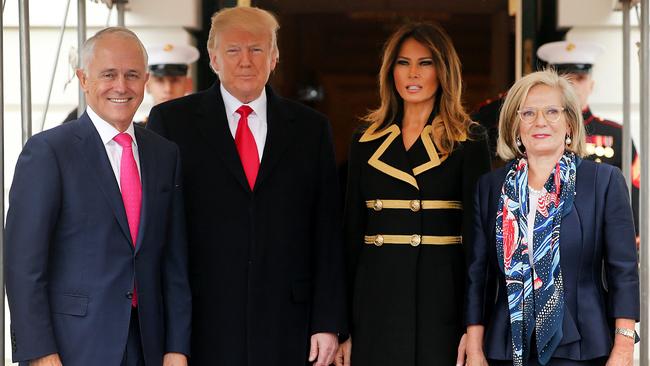White House rules out exemption for Australia from Donald Trump’s tariffs
The White House rules out granting Australia an exemption from Donald Trump’s new tariffs on steel and aluminium.

The White House has ruled out granting Australia an exemption from Donald Trump’s new tariffs on steel and aluminium unless the president himself changes his mind.
White House Trade Adviser Peter Navarro gave the clearest sign yet that there will be no exemptions for US allies when Mr Trump formally signs the new tariffs into law later this week.
“At this point in time there’s no country exclusions,” Mr Navarro said. “As soon as he (Trump) starts exempting countries, he has to raise the tariff on everybody else. As soon as he exempts one country, his phone starts ringing with the heads of state of other countries.”
Commerce Secretary Wilbur Ross said he did not expect the president to change his mind on exemptions. But both Mr Ross and Mr Navarro could not rule out the small chance that the unpredictable president could do a backflip.
So far Mr Trump and the White House have held firm against a global backlash caused by his plan to impose a 25 per cent tariff on imported steel and a 10 per cent tariff on aluminium.
The tariffs have sparked an international backlash against the US, especially from Canada and the European Union which will be hit hardest.
Australia, which exports $US210 million in steel and $US213 million in aluminium to the US each year has directly lobbied Mr Ross on the issue of exemptions without success.
Britain’s Prime Minister Teresa May spoke with Mr Trump saying she had “raised our deep concern at the president’s forthcoming announcement on steel and aluminium tariffs, noting that multilateral action was the only way to resolve the problem of global overcapacity in all parties’ interests.”
Mr Navarro played down the prospect of a trade was arising from the tariff decision. He also said that it would have only a minor impact on prices of goods with steel or aluminium components in the US.
“There are no downstream price effects on our industries that are significant,” Mr Navarro.
He claimed that it would only add a few cents to the price of a “sixpack or beer or Coke’’ and that US consumers would be happy to pay that in order to safeguard their local steel and aluminium industries.
Economists have warned that the tariffs will have a larger price increase on steel-dependent products across the US, leading to fewer sales and job losses.
Republicans are divided by Mr Trump’s tariff plan, with many in the traditionally pro-free trade party worried about the impact on other US industries as well as tit-for-tat trade wars.
Republican Senator Lindsey Graham said the decision would only hurt US industry and was ‘letting China off the hook.’
“You’re punishing the American taxpayers, and you are making a huge mistake,” he said.
Although the tariffs decision is said to be aimed at China rather than at US allies, it is those allies such as Canada, the European Union, South Korea, Britain and Japan who are hit harder.
China is only the 10th largest exporter of steel to the US.
The EU has threatened to responded with retaliatory tariffs on US goods including motorcycles and blue jeans.
In reply, Mr Trump tweeted: “If the EU wants to further increase their already massive tariffs and barriers on US companies doing business there, we will simply apply a Tax on their Cars which freely pour into the US. They make it impossible for our cars (and more) to sell there. Big trade imbalance!”
If the E.U. wants to further increase their already massive tariffs and barriers on U.S. companies doing business there, we will simply apply a Tax on their Cars which freely pour into the U.S. They make it impossible for our cars (and more) to sell there. Big trade imbalance!
— Donald J. Trump (@realDonaldTrump) March 3, 2018
A day earlier the president tweeted “trade wars are good and easy to win.’’
When a country (USA) is losing many billions of dollars on trade with virtually every country it does business with, trade wars are good, and easy to win. Example, when we are down $100 billion with a certain country and they get cute, don’t trade anymore-we win big. It’s easy!
— Donald J. Trump (@realDonaldTrump) March 2, 2018
Cameron Stewart is also US Contributor for Sky News Australia.







